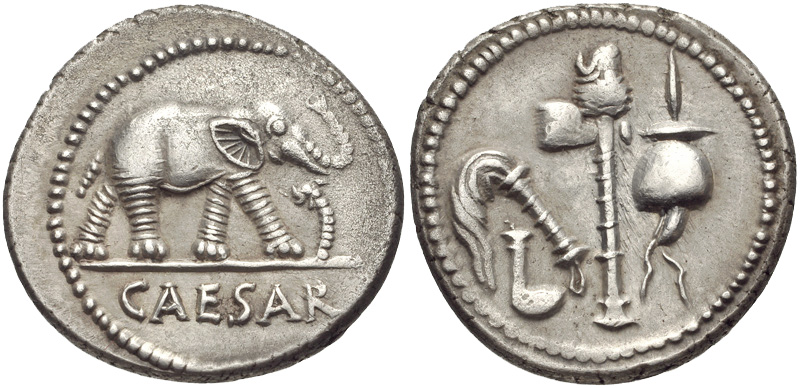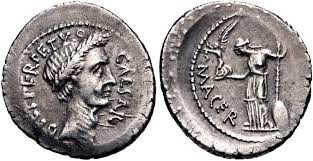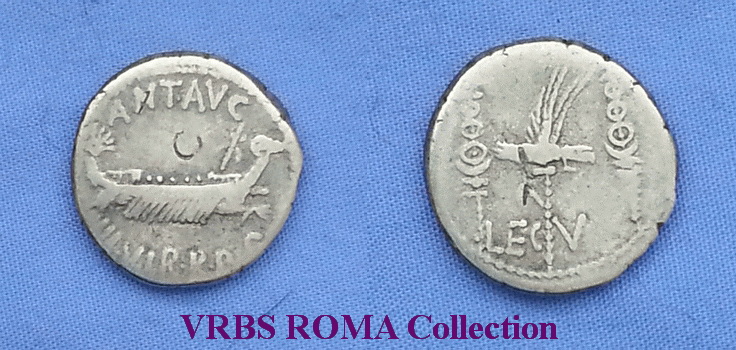|
|
|
Julius Caesar And His Coins
First published April 19, 2010
at Hubpages.com
Julius Caesar (Gaivs Ivlivs Caesar*) was
born in Rome on July 13, 100 BC to a family of aristocrats with a reputed
history reaching back to Ivlvs, son of the legendary Trojan prince Aeneas,
as well as to that of the goddess Venus; now that is classic Roman patrician
hubris; even more, it is smart and effective propaganda used to shape a
superstitions populous. The family coins go back as far as the moneyer
Sextus Julius Caesar, 129 BC (SEX. IVLI CAISAR on coins), and continue
in a loose familial way through to Nero the last Julio-Claudian emperor.
Keep in mind that Rome, and its neighborhood, was a very unstable and violent
place during the last two centuries BC. There were slave revolts that were
so expansive that a slave and gladiator named Spartacus is remembered today.
The action by the Roman Senate in the second century BC made soldiers of
many citizens, and while they were away fighting, the patricians grabbed
land. If a roman soldier returned and his land was not taken, it was in
bad shape and laden with a tax burden they were often unable to pay.
Not a lot is known about his childhood, but, when Julius Caesar became
a teenager (16 years old), that changed. Julius was an avid writer, and
gifted orator. He was quickly standing in the limelight of the Roman literate,
power mongers, and blessed-by-right-of-birth elite. At age 17, he married
Cornelius Cinna's, granddaughter Cornelia. Understand that Cornelius Cinna,
the grandfather, was a very powerful man, and women and marriage were tools
and used as property in Rome’s power pool. Julius was quickly swimming
in the deep end when he became a ‘flamens Dialis’ - a priest of Jupiter
at age 16/7.
To describe Roman women as property is by no means a stretch, but this
does not preclude their having power and influence. As you will read in
my subsequent articles about the emperors of Rome, women occasionally exercised
power equal to, and surpassing that of the emperor by using intellect,
emotional attachments, and familial leverage.
However, for young Julius, as much as he might have wanted to remain married
to Cornelia when, in 82 BC, Sulla demanded that he divorce her, Julius
had only two options. He could agree, or suffer. Julius chose to suffer
an absence of Roman life and aristocratic pleasures and opportunities,
by joining the military and leaving Rome. Family friends intervened to
save his life, so he was able to begin a military career that would eventually
bring him more power than any individual in the Mediterranean region. In
78 BC, Sulla died, and Julius was free to safely return to Rome. Here is
where something happened to Julius Caesar that not only described his shrewd
intellect, but the Roman way of thinking and moral standard of the time.
Julius returned to Rome, and began to establish himself as a advocate and
orator. In an effort to improve his rhetorical skills, Caesar left for
Rhodes in 75 BC to study under Apollonius Molon, who had previously taught
Cicero. While he was sailing to Greece he was kidnaped by Cilician pirates.
While with the pirates, Julius’s true colors were made clear. When the
pirates set a ransom, Julius pointed out that he was worth much more, and
insisted that they increase their demand. He gambled with the pirates,
played games, sang, and told them that when free he would see to it that
they were all crucified; they were suppose to have laughed at the young
man’s brashness.
He kept his word, however, but showed a leniency that was not so Roman
as it was Caesarian. Because they had treated him well, Julius had their
throats cut to lessen their suffering. Leniency on the part of Julius was
not a weakness, but a strategic tool that would pay off greatly in his
future. He also advocated for the common roman in order to take advantage
of the discontent of the times.
While Julius served in the army, he demonstrated a gift for strategy and
aggression. When he returned to Rome, he was in control of many legions,
and much wealth. The tradition in Rome was that a returning commander would
dismantle their armies at the Rubicon River and return to Rome as a citizen.
In 49 BC Julius, with the XIII Legion, crossed the Rubicon, and headed
for Rome.
The tradition of putting down one's sword, and picking up a plow sheer
was built upon Lucius Quinctius Cincinnatus, namesake of the US city Cincinnati
in Ohio. Cincinatus was a farmer who was twice called by the Senate to
lead their armies as supreme dictator of Rome. When successfully completing
these tasks, he return to his farm. There is more about Cincinatus further
on in this article.
At the time Julius and his legions crossed the Rubicon, his legionary coin
makers produced a great deal of coins depicting an elephant trampling a
snake. This coin was used to pay the thousands of soldiers under his command;
the soldiers that eventually put him in control of Rome, and defeated Pompey.

Wiki Commons
Julius was on the cusp of changing coin design in a way that would persist
to this very day. He went beyond placing his name on coins. A couple months
before his death, the senate allowed his image to be placed on coins that
declared Julius Caesar dictator for life. Produced by the moneyer
P. Sepvllivs Macer, this coin is often referred to as the coin that killed
Julius Caesar.

Wiki Commons
Alexander the Great had an image of himself as Hercules on most of his
coins, and Roman moneyers in the past put the images of their ancestors
(Real and mythical) on coins, but Julius was the first to put his own image
on a coin. This raised the ire of many, but not so much as the coins
declaring Julius Caesar as dictator for life. |
|
Articles
By: Anthony Ballatore
Roman Emperors & their Coins
0)
Ancient Roman Coins On Ebay
1)
When, where & why were coins first made?
2)
The Story of Romulus and Remus & The Birth of Rome
3)
The Roman Republic
4)
Julius Caesar and the Death of the Republic
5)
Augustus Caesar: The First Roman Emperor
6)
Tiberius Caesar: The First Julio-Claudian Heir
7)
Caligula: The first really crazy Caesar
8) Claudius: A level headed Caesar?
9) Nero: The Last Julio-Claudian Heir
|
|
Websites worth knowing:
WildWinds.com
By far the single best location for identifying, evaluating, and touring
ancient coins. This link will direct you to their seach engines. Enjoy.
ForumAncientCoins.com
Along with WildWinds, this is a site of the highest regard, accurate
information, and ethical policies; 'AUTHENTICITY GUARANTEED FOR ETERNITY'
says it all.
FSRCoins.com
Frank S. Robinson is a unique individual. I have more respect for Mr.
Robinson than any other coin dealer. His book 'The Case for Rational
Optimism' (2009) will most likely leave you with this same perspective.
If his book doesn't, dealing with him will. He is often mistaken for Neil
Armstrong. :-)
Harlan
J. Berk, Ltd.
Located in Chicago, Harlan J. Berk, Ltd. is an excellent location for
both common and rare coins; often of
museum quality.
Rg.ancients.info
Reid Goldsborough's web pages are well written, educational, the first
site to read regarding counterfiet coins. This site is hosted for free
by VCoins.
VCoins.com
A commercial coin and information site established December 3, 1998.
Their code of ethics and years of operation speaks loudly.
DirtyOldCoins.com
Another commercial coin and information site.
ThePenAndQuill.com
One of our sites dedicated to pens, ink, quills, books, writing, reading,
history, and anything else that envolves language, art, and ideas.
|
Being declared dictator was not a big deal to romans as it did not carry
the connotation of evil that it carries today, it was the ‘for life’
part that crossed the line. 'For life' was tantamount to saying 'King'.
The tradition of patricians stepping up to be dictator in times of need
is beautifully describe by the life of Cincinnatus of 513 - 490 BC.
In 458 BC Cincinnatus was asked to come out of retirement on his farm to
save Rome from the rivaling tribes of the Aequians, Sabinians and Volscians.
He did so at the battle of Mons Algidus. Again in 439 BC he was asked
to become dictator for a second term to put down a revolt by the plebeians.
The story is that in both instances, Cincinnatus save Rome, immediately
put down his sword, picked up his plow, and return to his farm. Julius
did not.
There are only a handful of coins issued by Julius Caesar. They are
all made of silver but for one. Some are very common, and others
are very rare. They are all coveted by coin collectors, and therefore
demand a high price. The single bronze coin was minted in 45 BC.
It, along with one issued by Pompey, were the first Roman bronze coins
issued in around forty years, and would be the last until roman coinage
was reformed by Augustus in 22 B.C.
Coins with Caesar’s portrait that were issued by moneyers during Caesar’s
lifetime are also very sought after by collectors. Here is a list
of the moneyers who produced coins with Caesar’s image. You can
learn much more by running a search at WildWinds.com:
(WildWinds.com
is without a doubt the best source to identify ancient coins.) Identifying
bulk, uncleaned coins can be an adventure. Although most bulk coins
have been searched through by people with an experienced eye for spotting
the gems, they make mistakes, and therein lies the joy of learning to clean
ancient coins.
Moneyers who produced coins with an image of Caesar:
Aulus Hirtius
C. Clovis
L. Munatius Plancus
A Allienus
C. Cossutius Maridianus
L. Aemilius Buca
L. Flaminius Chilo
L. Livineius Regulus
L. Mussidius Longus
Marcus Mettius
P. Sepullius Macer
Q Voconius Vitulus
Tiberius Sempronius Gracchus
&
Mark Antony - Mark Antony was a dear friend and general
of Julius Caesar’s. Following the assassination of Julius, Antony (32/31
BC) produced a massive amount of legionary coins at his villa in order
to finance the battles with the assassins. One of these coins is that of
Legion V ‘Alaudae’; a legion created by Julius himself three years
before he crossed the Rubicon.

When reading
Latin found on ancient Roman coins, keep in mind that the 'J' did not exist,
the 'I' stood in for the 'J', and the 'V' stood in for the 'U' and 'W';
hence Julius Caesar's full name was spelled 'Givs Ivlivs Caesar'. |
|
|